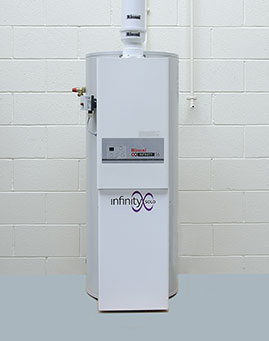AECOM, a major global player in the building engineering services consultancy arena, has concluded a report showing that continuous flow water heating systems have a clear advantage in terms of initial capital costs as well as life cycle costs over 20 years, when compared with stored hot water systems*.
The ‘Life cycle study of continuous flow water heating systems’ shows that continuous flow water heating systems can be up to 7% more economical than equivalent ‘traditional’ stored hot water systems.
AECOM was commissioned to carry out a life cycle study on continuous flow water heating systems, and to provide a comparison with conventional storage systems. Two case studies were provided that are based on projects using continuous flow water heating systems.
AECOM then determined an equivalent storage based system for each case study and compared operational and capital costs.
For the life cycle comparison, the analysis period was 20 years, based on the expected service life. The net present value (NPV) calculation is based on a discount rate of 3.5% (The GREEN BOOK – HM Treasury), an inflation rate of 2% for servicing costs and projected retail fuel costs from DECC1.
In both case studies the continuous flow system showed a clear advantage in terms of initial capital costs, as well as life cycle costs over 20 years, with the continuous flow system consistently lower in energy use than the two storage systems.
Case study 1
This was a system for a typical, small, pre-fabricated fast food restaurant. It is assumed the system only serves the hot water demand.
The life cycle analysis includes the initial capital costs, projected annual fuel costs, and estimated annual servicing costs which are assumed to increase by 2% each year. The annual fuel cost assumes the same daily fuel consumption over the whole year.
The servicing cost is based on £130/year per boiler, and £160/year for a boiler and cylinder. The resulting net present values of the three showed that the continuous flow system is 6 – 7% lower than the two storage systems based on that 20-year analysis period.
Case study 2
This was a system for a shower block in a holiday camp, with six showers and four basin taps.
For the continuous flow option, the analysis is based on a configuration of 4 continuous flow water heaters that each have a nominal output of 48 kW, which, for this particular application, because there is a very short run of pipe work between the water heaters and the fixtures, it is possible for the water heaters to generate water at 40°C. The risk of legionella is overcome by regular flushing of the system.
For the energy required to deal with the instantaneous hot water demand the analysis assumes that the bulk of the hot water demand would be due to the showers. Each shower would typically have a flow rate of around 9 litres per minute, which if mixed to 40ºC would equate to an instantaneous load of around 19 kW each, so even if there was only one shower running, the load on a single continuous flow water heater would equate to an efficiency of 95% based on the performance curve. As the hot water demand increases, the modular nature of this particular configuration would allow the 95% efficiency to be maintained for the bulk of the demand.
The difference in daily fuel costs between the three systems is around 7%. The usage profile for this case study is particularly suited to continuous flow systems (i.e. high but infrequent demand over the day), which is why there is an advantage in fuel consumption over the storage systems.
Systems employed in the study
*Indirect fired storage systems
This consists of separate heat source and storage cylinders, where for this study the heat source will be gas fired boilers running on 80ºC flow and 60ºC return with gross efficiency of 89%. As the hot water is stored at 60ºC in insulated cylinders there will be standing heat losses. The standby electricity is assumed to be 15W per boiler, and 60W when operating to cover fan and controls.
Direct fired storage systems
This is where the hot water storage cylinder has an integral gas burner to directly heat the water, and the key difference with indirect fired storage systems is that they are designed to operate in condensing mode and generally achieve gross efficiency up to 96%. A disadvantage of direct fired storage systems is that the standing losses are around 3 times higher than indirect storage cylinders.
Continuous flow systems
This is essentially a gas boiler that is designed to instantaneously heat mains water for supply directly to water fixtures without any storage. The key advantages with this type of hot water heating, is firstly saving in space needed for hot water cylinders and the associated standing heat losses. The challenge is that instantaneous hot water demand can vary hugely for most systems and therefore the continuous flow heating system needs to have a wide modulation range as well as maintaining efficiency over that range.
For more information on the RINNAI product range of high efficiency condensing continuous flow hot water heating units and systems visit www.rinnaiuk.com.






